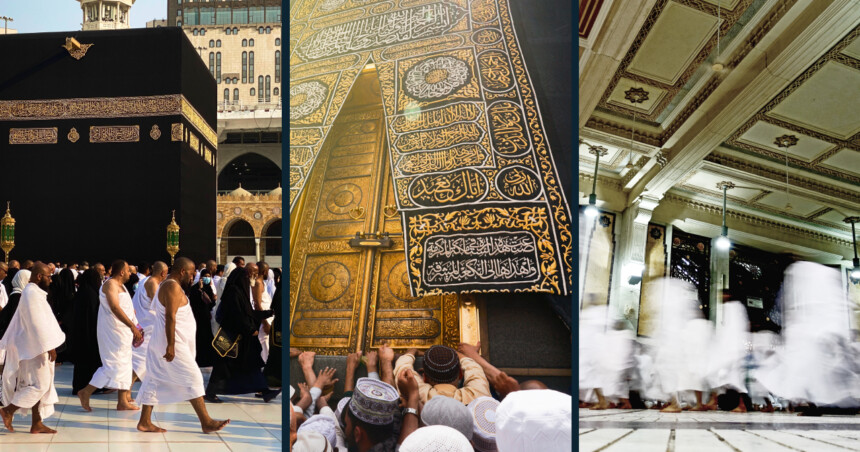Not long from now, millions of pilgrims from around the world will be making their way to Makkah to fulfil the fifth pillar of Islam: Hajj.
This journey carries countless objectives, but today I want to focus on just one of them.
Shah Waliullah Ahmad ibn Abdul-Halim ad-Dihlawi said,
ومن مقاصد الحج موافقة ما توارث الناس عن سيدنا إبراهيم وإسماعيل عليهما السلام فإنهما إماما الملة الحنيفية، والنبي بعث لتظهر به الملة الحنيفية وتعلو به كلمتها، وهو قوله تعالى: مِّلَّةَ أَبِيكُمْ إِبْرَاهِيمَ
One of the main purposes of Hajj is to imitate the legacy of Prophet Ibrāhīm and his son Ismā’īl, for they were the leaders of the pure monotheistic faith.
As for our Prophet Muhammad ﷺ, he was sent to bring this pure way back to life and to make its truth shine, just as Allah says: ‘The faith of your father Ibrāhīm.’” [1] [2]
Why did Allah choose to make one of the five pillars of Islam a re-enactment of his footsteps specifically?
Despite being a story from thousands of years ago, Allah chose to eternalise it — linking our Islam and our fate in the Hereafter to Ibrāhīm’s footsteps and those of his family.
To answer this question, we must first set the stage by asking: who was Ibrāhīm?
A short background
Ibrāhīm (ʿalayhi al-Salām) was the son of one of the leading dignitaries of his time — Āzar — who was not only a respected figure in Babylon, Iraq, but also the very craftsman of the idols that his people worshipped and bought as gods.
Ibrāhīm, however, was very different from his father. Even as a young man, Allah describes him by saying:
وَلَقَدْ آتَيْنَا إِبْرَاهِيمَ رُشْدَهُ مِنْ قَبْلُ
And We had certainly given Abraham his sound judgement before.” [3]
The Qur’ān depicts Ibrāhīm’s struggle against his people, where all the odds were stacked against him. It tells us of his debates with them, his demolition of their idols, their furious reaction and attempts to burn him alive — and how Allah altered the very laws of physics so that the fire would not harm him.
The Qur’ān also tells us of his advice to his father, confrontation with the tyrant of his time, how he was eventually forced to leave his homeland — alone. He was, at that point, the only believer on the face of the Earth.
He travelled the world, searching for an alternative, but he found that the cities he visited were no different from each other: all drowning in idolatry and disbelief.
He arrived in al-Shām, and from there migrated to Egypt, where he narrowly escaped a tyrant who attempted to seize his wife. Once again, he invited people to submit to Allah and to abandon idolatry.
Commandment to leave his wife and child
But it wasn’t long before he was commanded once more to leave — this time, with Hājar and their young son, Ismā’īl. The destination: Makkah, an empty and desolate plot of land, without a trace of life or the most basic necessities to survive.
There, Ibrāhīm was commanded to leave Hājar and Ismā’īl — to walk away, and he submitted. After handing Hājar a small bag of dates, he turned and walked away. But soon the dates finished. Hājar’s milk began to dry up. The baby cried in hunger.
Driven by desperation yet held steady by hope, Hājar began running between the two mounts of Safa and Marwah, desperately searching for any form of aid.
In her heart, she experienced the intense contrast between terror, as any mother would, and serenity, a reflection of her remarkable īmān.
She was puzzled, but not hopeless. She was certain, but not idle. She did all she could — and Allah honoured her by allowing the blessed water of Zamzam to burst forth from beneath her baby’s feet!
The ultimate test of faith
Ismā’īl grew up — and with him grew Ibrāhīm’s love and attachment to his son.
But for a heart like Ibrāhīm’s, this posed a challenge. For the heart of a man of his rank must be reserved entirely for Allah, free of any rivals. Thus, the painful command came: he was instructed to sacrifice his son.
Ibrāhīm saw the dream repeatedly and knew that it was a command that must be fulfilled. So he submitted, turning to his son and saying:
يَا بُنَيَّ إِنِّي أَرَى فِي الْمَنَامِ أَنِّي أَذْبَحُكَ فَانْظُرْ مَاذَا تَرَى
O my son, indeed I have seen in a dream that I sacrifice you, so see what you think.” [4]
Ismā’īl’s response was nothing short of Abrahamic submission:
يَا أَبَتِ افْعَلْ مَا تُؤْمَرُ سَتَجِدُنِي إِنْ شَاءَ اللَّهُ مِنَ الصَّابِرِينَ
“O my father, do as you are commanded. You will find me, if Allah wills, of the patient.” [4]
This is when Ibrāhīm does the unthinkable. He walks with his son to the place where the slaughter is to be carried out.
At this point, Shaytān makes his presence known, attempting to persuade Ibrāhīm to abandon the command of Allah. But Ibrāhīm, resolute, pelts him with stones. Shaytān appears a second time, then a third — and on each occasion, Ibrāhīm drives him away with stones.
At this moment, it is as if the motion of the universe itself had paused, holding its breath in anticipation of what was about to happen.
Ismā’īl had knelt down, his forehead pressed to the Earth, shielding his face from his father so that no expression might cause him to hesitate — and the knife was placed against his throat.
Ibrāhīm forcefully suppressed every fatherly emotion, every natural attachment, focusing solely on fulfilling the command of his Lord.
Allah says,
فَلَمَّا أَسْلَمَا وَتَلَّهُ لِلْجَبِينِ
And when they had both submitted, and he put him down upon his forehead…” [5]
It was then that Ibrāhīm was called:
يَا إِبْرَاهِيمُ (104) قَدْ صَدَّقْتَ الرُّؤْيَا إِنَّا كَذَٰلِكَ نَجْزِي الْمُحْسِنِينَ
O Ibrāhīm! You have fulfilled the vision. Indeed, thus do We reward the doers of good.” [6]
Allah then sent down a ram from Paradise to be sacrificed in place of Ismā’īl. The act of slaughter was no longer required, because submission to Allah had already been fulfilled. That was the purpose all along.
The first masjid on Earth
At that moment in history, the world was flooded with places of devil worship, venues of idolatry, and centres of immorality.
The people of falsehood had their temples, but the people of tawhīd — those who worshipped Allah alone — had no place to gather and call upon Him.
So Allah commanded Ibrāhīm to build the first masjid on Earth — and without hesitation, Ibrāhīm submitted.
Allah says,
إِنَّ أَوَّلَ بَيْتٍ وُضِعَ لِلنَّاسِ لَلَّذِي بِبَكَّةَ مُبَارَكًا وَهُدًى لِّلْعَالَمِينَ
Indeed, the first House established for mankind was that at Makkah — blessed and a guidance for the worlds.” [7]
Father and son worked side by side, carrying stones and raising its foundations, until the humble but sacred structure of the Ka‘bah stood — ready to become the most beloved place on Earth.
Then the commandment was made to Ibrāhīm to invite humanity to Hajj,
وَأَذِّنْ فِي النَّاسِ بِالْحَجِّ يَأْتُوكَ رِجَالًا وَعَلَى كُلِّ ضَامِرٍ يَأْتِينَ مِنْ كُلِّ فَجٍّ عَمِيقٍ
And proclaim to the people the Hajj [pilgrimage]; they will come to you on foot and on every lean camel, coming from every distant mountain pass.” [8]
Ibrāhīm asked,
O Allah, how will my voice reach the people?”
Allah replied,
You make the call — and We will deliver it.”
So Ibrāhīm obeyed. He climbed Mount Abu Qubays and, with nothing but his voice, he called out:
O people! Allah has prescribed Hajj upon you — so perform Hajj!”
And just as Allah promised, that call travelled across the Earth and echoed through the generations.
Today, from every corner of the globe — Russians, Chinese, Europeans, Americans, Arabs, Africans, and countless others — people continue to respond to that ancient call.
Re-enacting the sacrifices of Ibrāhīm
When you look at the rites of Hajj, you realise that much of what we do is a re-enactment of the life and sacrifices of Ibrāhīm and his family, values that Allah loves.
Values, as is the case with everything, wear away in the grind of life. Hajj is a powerful reset.
The Prophet Muhammad ﷺ said,
قفوا على مشاعركم، فإنّكم على إرثٍ من إرث أبيكم إبراهيم
Visit the religious sites, for you are following the heritage of your father Ibrāhīm.” [9]
Consider Hājar’s desperate running between the two Mounts of Safa and Marwah, seven times, as she searched for any sign of life to save her hungry child.
Reflecting on this, Ibn ‘Abbas said,
فَذَلِكَ سَعْيُ النَّاسِ بَيْنَهُمَا
This is why the pilgrims perform the exact same Sa’ī between the two Mounts.” [10]
Consider Ibrāhīm’s stoning of Shaytān when the devil tried to dissuade him from carrying out Allah’s command.
Reflecting on this, Ibn ‘Abbas said,
الشَّيْطَانَ تَرْجُمُونَ، وَمِلَّةَ أَبِيكُمْ إِبْرَاهِيمَ تَتَّبِعُونَ
Likewise, you pelt the devil, following the way of your father Ibrāhīm.” [11]
Consider Ibrāhīm’s intent to slaughter his son as sacrifice.
Reflecting on this, Shaykh Abdul Rahman al-Sa‘di said regarding the pilgrim’s sacrifice during Hajj:
هو اقتداء بالخليل صلى الله عليه وسلم حيث فدى ابنه إسماعيل بذبح عظيم
It is following the example of Ibrāhīm (sall Allāhu ʿalayhi wa sallam), when his son Ismā’īl was ransomed with a great sacrifice.” [12]
It is truly the case, when we are told by the Prophet ﷺ,
Visit the religious sites, for you are following the heritage of your father Ibrāhīm.” [9]
In fact, this heritage was imitated by other great prophets after Prophet Ibrāhīm, including Mūsā and Yunus.
Ibn ‘Abbas narrates that the Prophet ﷺ once passed through a valley known as al-Azraq.
He (ﷺ) asked,
Which valley is this?”
They replied,
This is the valley of al-Azraq.”
Upon hearing this, the Prophet ﷺ said,
It is as if I can see Mūsā descending from the mountain pass, loudly calling upon Allah with the Talbiyah: ‘Labbayk Allahumma Labbayk!'” [13]
Later, when the Prophet ﷺ reached the mountain pass of Harsha, he asked,
Which mountain pass is this?”
They replied,
The mountain pass of Harsha.”
He (ﷺ) said,
It is as if I am seeing Yunus, the son of Matta, riding a sturdy red camel, wearing a woollen cloak, with the reins of his camel made from palm-fibre, as he calls upon Allah, saying: ‘Labbayk Allahumma Labbayk!'” [13]
In fact, upon his return to this world, Prophet ‘Īsa (ʿalayhi al-Salām) will also perform Hajj.
The Prophet Muhammad ﷺ said,
وَالَّذِي نَفْسِي بيَدِهِ، لَيُهِلَّنَّ ابنُ مَرْيَمَ بفَجِّ الرَّوْحَاءِ، حَاجًّا، أَوْ مُعْتَمِرًا، أَوْ لَيَثْنِيَنَّهُمَا
By the One in Whose Hand is my soul, the son of Mary (Jesus) will surely enter into Ihram in the valley of al-Rawhā’, performing Hajj or ‘Umrah — or both.” [14]
Embodiment of full submission to Allah
After coming to understand who Ibrāhīm (ʿalayhi al-Salām) was, and how Hajj is an actual demonstration of his life, we can now return to the central question: why him?
Why was it his legacy that Allah chose to eternalise in one of the pillars of Islam — the pillar of Hajj?
There is one defining trait that appears time and again across nearly all 69 mentions of Ibrāhīm in 25 chapters of the Qur’ān: Islam — submission. He was the living embodiment of what it means to submit fully to Allah.
By “Islam”, I don’t merely mean the boundary that separates disbelief from belief. I’m referring to Islam in its actual and transformative sense — that absolute surrender to Allah, where a person almost loses sight of their own reflection in the mirror, seeing only what Allah wants them to become.
Allah says about him,
وَلَقَدِ اصْطَفَيْنَاهُ فِي الدُّنْيَا وَإِنَّهُ فِي الْآخِرَةِ لَمِنَ الصَّالِحِينَ (130) إِذْ قَالَ لَهُ رَبُّهُ أَسْلِمْ قَالَ أَسْلَمْتُ لِرَبِّ الْعَالَمِينَ
And We had chosen him in this world, and indeed he, in the Hereafter, will be among the righteous.
When his Lord said to him, ‘Submit’, he said ‘I have submitted to the Lord of the worlds.'” [15]
Submission after submission, without hesitation
To elaborate, he was commanded to migrate time and time again — and he submitted. He was commanded to circumcise himself at the age of eighty, and he submitted. He was blessed with a child in old age — and those who have been given a child after years of longing know the depth of that joy.
Then came a command: that beloved child would not be raised with him. Take him — still a breastfeeding infant — and his mother to Makkah, a barren valley, and leave them there. And he submitted.
He was instructed to turn back and leave on the same journey — not even to spend a single night with them.
Today, when we leave our children in a foreign land, we sort out the Internet, accommodation, services, the social circle. We hang around a while before we say goodbye.
But Ibrāhīm? No. Leave them with a bag of dates and water. Turn your face — and say nothing, and he submitted. Hājar asked, not knowing why Ibrāhīm was doing this, but despite her incessant pleas, he didn’t answer.
Finally, she asked,
Did Allah command you to do this?”
He didn’t even speak — he simply nodded. He couldn’t talk.
She said,
Then He will not let us down.”
Back he went to al-Shām — a journey of a month. What must he have felt along the way? What pain must have filled his heart? Yet he submitted.
Eventual relief and eternal honour
Hājar, who had barely spent any time with Ibrāhīm, had already internalised this ethic of submission. She had accepted Islam through him — and she too submitted.
It’s also clear that Hājar had passed this ethic of submission to her son Ismā’īl — because Ismā’īl wasn’t raised by his father, but by his mother.
On one visit — finally reunited with his son after years apart — Ibrāhīm (ʿalayhi al-Salām) had only a brief moment of joy before it was taken from him again. Then the unimaginable command came, to slaughter his son. What made it even more staggering was that Ismā’īl was not to be handed over to someone else — it was his own father who would carry out the act.
And yet, astonishingly, the son not only accepted the command — he encouraged it:
O my dear father, do as you are commanded.” [4]
It’s as though Ismā’īl was saying words to the effect of,
My mother told me the story — when you left us in Makkah, though I was too young to remember it.
She asked if Allah had instructed you. And when you nodded, she said: ‘Then He will not let us down.’
Allah did not let us down then, and He will not let us down today. I submit.”
As a result of the combined submission of Ibrāhīm’s family to Allah: Zamzam water flows till the end of time, the Sunnah of Udhiyah continues in remembrance of their story till the end of time, the Ka‘bah, built by Ibrāhīm and Ismā’īl, is visited until the end of time, and their legacy is recited in the Qur’ān until the end of time!
The message is clear: the outcome of submission to Allah is always eventual relief and eternal honour.
The beauty of the family of Ibrāhīm is that they only ever asked one question, the same one I hope you’ll ask yourself when faced with decisions on buying things, on dressing, inhaling what we should and should not, texting back when we should delete the message, on praying or delaying.
Their one question was,
Does Allah want this from us?”
And if the answer was “yes” — it was a closed case.
Submission.
Yes, peace is a core message of Islam, and yes, justice is a central pillar. But the defining value — the very heart of Islam — is submission.
Source: Islam21c
Notes
[1] Hujjatullāhi al-Bāligha
[2] al-Qur’ān, 22:78
[3] al-Qur’an, 21:51
[4] al-Qur’an, 37:102
]5[ al-Qur’an, 37:103
[6] al-Qur’ān, 37:104-105
[7] al-Qur’ān, 3:96
[8] al-Qur’ān, 22:27
[9[ Abu Dāwūd
[10] al-Bukhārī
[11] al-Hākim and Ibn Khuzayma
[12] al-Irshādu Ila Ma’rifatil Ahkām
[13] Sahīh Muslim; https://sunnah.com/muslim:166b
[14] Sahīh Muslim; https://sunnah.com/muslim:1252a
[15] al-Qur’ān, 2:130-131








Timeless lessons as usual. TabakAllah